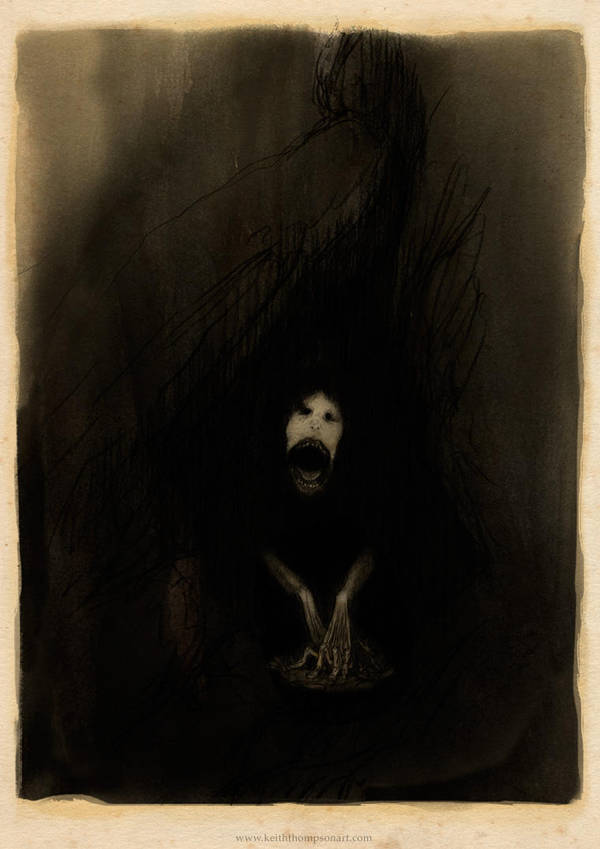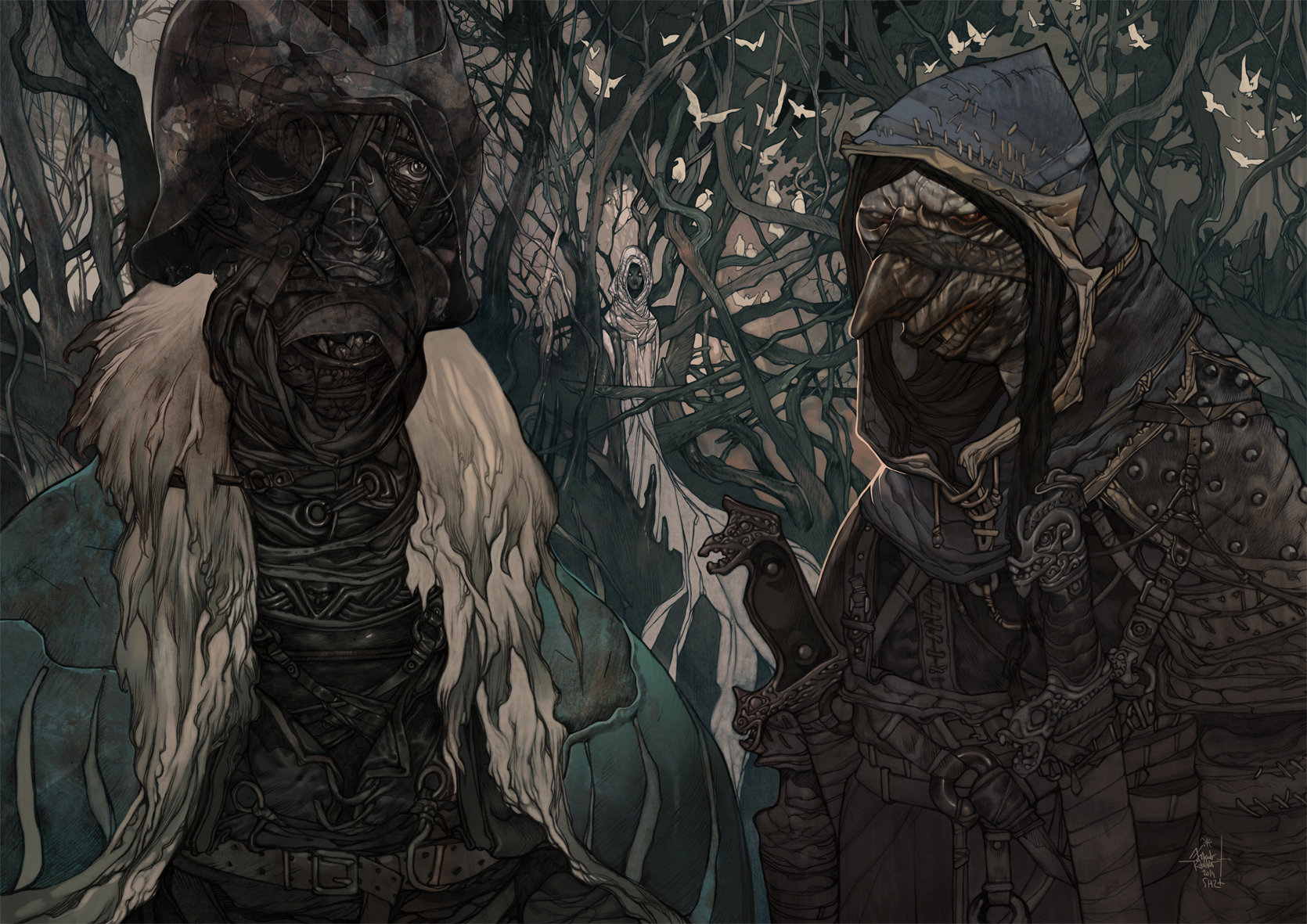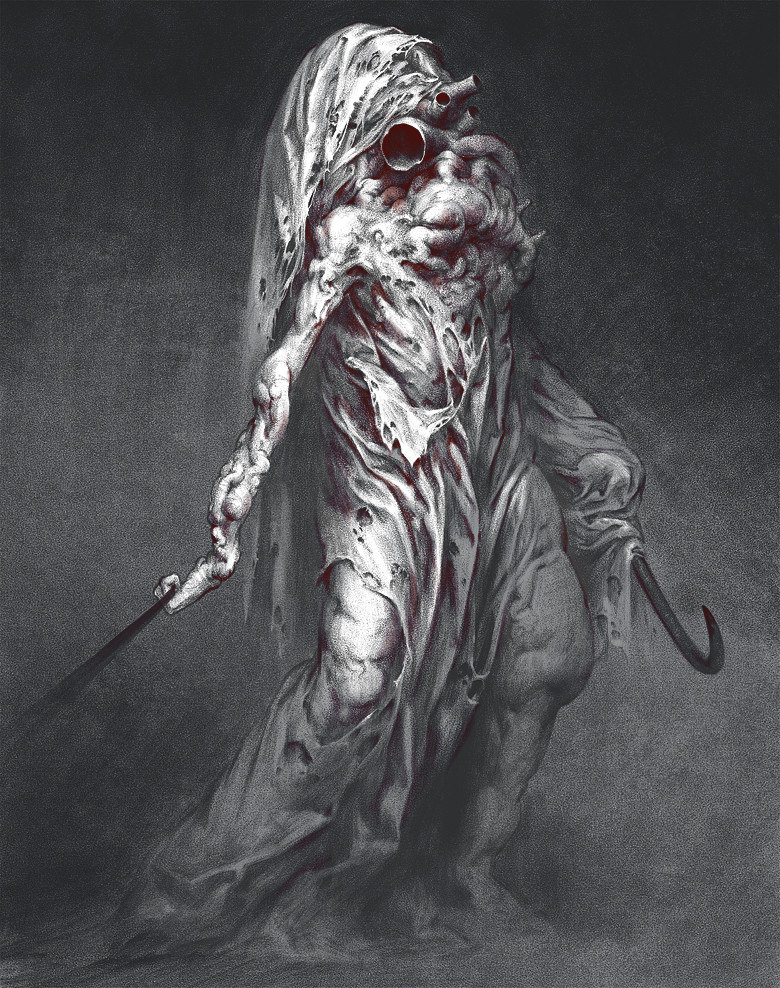Do Gods fear death?
No. Though perhaps they should. Gods tend to be wholly convinced that they are immortal, which is of course not at all the case. They are however exempt enough from direct confrontation with death of their kind that they view it as something that happens to others, something that is distant and unrelatable, something that is improbable. They don't worry about the end.
But they can decay, like anything else. And like humans they are terrified of that.
Especially those, puritans and moralists, who work with great effort to maintain their immaculate veneer, and even those chauvinistic enough to fantasise about clean and polished civilisation, who want to play in their little neat sandbox, who spite everything lacking the tyrannical purity that they idolise.
All the great phantoms of the spheres are manifest through the ecstasies and terrors of the beings that live in them, and they perpetuate them in kind. The Orcus is no different. It spills alike from broken truth, and pours as lies from pearl-necklaced heads. Sense collapses. Clean turns filthy. Beauty shrivels. Bodies to blubber. Faith crumbles. Consciousness erodes. Agreements break. Help and aid bubble to grease and revulsion. The Orkus is physical, mental, social decay. It is the maggots in the carcass. Corruption. Bloat. A stagnant body crumbling under its swollen weight. it is the mind beset by so much misleading, misfortune, terror and inner disgust that it becomes a half-mind. A rot-mind, capable of nothing but screaming in the dark.
Its name stems from the idea of the Ur-Ghast, the primal progenitor of the undead that embody its emblematic decay, that express the notion of decay in their very being. But a name is a structure, a construct, and so it too must decay. At this point it is the Orkus. In a few centuries it will probably be something like the Orghs, and further down the line, it may just be the guttural grunt.
Classical D&D depicts the Orkus as a sort of fat demon goat. A strange idol indeed. The most accurate depiction or manifestation of the Orkus would be a vast lake of black, grimy, foul oil-like sludge, completely putrified. Where does it live (if it can even be called alive)? In the dark shadows of a decomposing body's eye sockets. In the dark corridor where maids suffer the brutality of the depraved duke. In the hollow windows of ruined houses filling penniless ghettos and derelict cities. They are the Orkus. The filth under your fingernails, the grody film around the shower drain, ever so thin, is the Orkus.
 |
| Art by Keith Thompson |
Who worships the Orkus? No one. However, you can lose yourself to the Orkus. As a person, but also as a community, or even as a civilisation. It starts with neglect. Of friends, of hygiene, of morals, of duty, of anything that needs care and maintains a structure. This devolves into a fundamental apathy and putrification of the self. At this point all that drives your actions is pure spite, towards everything that you've neglected, because you hate that other people enjoy what you've failed to keep. You must bring them down to your level, because you've lost all hope to pull yourself up again. They must become like you, because the reality of the alternative is too painful for you to bear. So you become a festering bloat that befouls everything, and heals nothing.
What classic D&D got right, is that the Orkus is deeply tied to undeath. After all, an undead is a grisly mirror-image of a wholesome human. The undead in the grip of the Orkus are no clean skeletons or ghosts: they are zombies, ghouls, ghasts, rotting pulps of viscera and stench and maggots, blemished and diseased wretches. They are the face of human spoiling in body, in mind, and in soul. They are hard to look at. They are disgusting. They are a confrontation with every human's posthumous fate, with the tarnish and defacement that awaits.
 |
| Art by Jakub Rebelka |
Sometimes the Orkus was used as a weapon. Artillery shells were filled with its black bile. Water wells poisoned. Once, it was even turned into a gas. The results, as you might expect, were hideous. They could not control the gas, because it began dripping from their mouths, vile beings as they were having created it. They were all taken by the Orkus. The chief inventor of ORKGAZ killed himself in a moment of lucidity from his state of decay. By that point his house was all but consumed by mould and cement rot, the carrion of dead rats was oozing its juices through his ceiling, and he had eaten his cat, the bones strewn around the dead-stinking kitchen. His death didn't stop his decay. The house ate the pus-ridden flesh from his bones, or perhaps the other way around, and now he crawls, as an undead behemoth, through the wasteland. The Orkus wins. Everyone loses.
Necromancers who draw their power from the Orkus are misanthropic, unhygienic, amoral shit sacks that only resemble people if they are lucky. They'll be infected with the Orkus over time, as they gurgle it up from their innards. Teeth rotting, skin turning black and yellow and gangrenous. Bloat. Necrosis. Their name will turn from Johan into Jhhng into hoarse hiss. They neither sleep nor eat, at first because they neglect doing it, then because they lose the organs to. They die somewhere along the way, but as long as there are tendons to pull on the bones, they keep going.
Orkus necromancers cannot make anything. They can only break things down, not build them back up. They can't improve anything with fleshcrafting, they can only amalgamate things together to form unity in rot. They can't create order or structure. They can't heal in any possible way, not even themselves or their own undead. Learning a spell of the Orkus will gradually rot away the other normal spells in your brain, turn them into bug-riddled festering versions of themselves.
|
Fireball |
Exploding Corpse |
|
Magic Missile |
Insect Burst |
|
Light |
Pallor |
|
Cure Wounds |
Infest Wounds |
|
Fly |
Gaseous Jet |
|
Hold Person |
Enfeeblement |
|
Mage Hand |
Pull to Darkness |
|
Mage Armour |
Aura of Stench |
|
Web |
Mould |
|
... |
... |
These rotting spells are never as powerful as the original, and if they deal damage, it is necrotic instead of what it's supposed to be. Over time they'll rot even further, and you may lose some spells altogether as their carrion thoroughly dissolves and leaks out of your brain as a soup of arcane pus.
Powerful items of the Orkus do not look magical or intricate or wonderous. They're disgusting. People will ask why the fuck you have something like that on you. And then they'll look at your face under your hood and scream. Some examples of Orkus items:
If the wand is ever finished, and detonated, it may spell the End.
As you've noticed by now the Orkus is more of an infestation than anything else. Its undead and necromancers form hives in derelict villages, cities, compounds, factories, sewers, and other ruins. They'll try to spread, because that's what they do, turning meat to sludge and concrete to gravel and wood to pulp along the way. They bring disease, parasites, maggots and flies, miasma and infection.
 |
| Art by Konstantin Kostadinov |
- The ribcage of Vrghhrh, meat hanging on it, infected with at least four kinds of insects, kept in a bloodied sackcloth bag. When you set it over your head, no telepathy or mind-affecting effects can reach you through its miasma and its rotting aura disillusions you from any phantasm trickery, but its stench nauseates you and its resident insects come to partake in your flesh. Permanently lose a point of randomly either Charisma or Constitution, each round you wear it.
- The remnants of an ORKGAZ artillery shell. A black greasy film of the Orkus still sticks to the rusted twisted metal. You can empower a necrotic effect with this to increase both its range and spread, holding it like a catalyst, but touching the shell rots your hands away. Using the shell permanently costs a point of Dexterity.
- A ghoul's clawed arthritic hands, tied together with frayed rope. They are still twitching under their bonds. The blackened scabbed fingers ooze the infected pus that causes muscle spasms and contraction. Harvest a dose of paralytic poison per day.
- A grimy tin can of spoiled meat, riddled with fly eggs. Remnant of some war that neither side, but instead the Orkus, won. Raised undead release a flesh-eating fly swarm when ruptured/killed.
- A blood- and shit-stained brick of some old sewer. Its scraped, filthy stone embodies decades of neglect. If you awaken its ruin, by smashing some living thing dead with it, the blood will corrode it and make it brittle like an eggshell. It can then be broken to release the Orkus, quickly collapsing stonework, walls or other architecture. The size of this effect is proportional to the sacrifice.
- A clothing rag soaked in blood that won't dry and has turned into a forever-wet dark stinking muck. The testament of violence and abuse the identity of which has long since passed to oblivion. When you wear it, those who deal damage to you suffer a proportional Charisma drain that makes them brutish, animalistic and obscene.
If the wand is ever finished, and detonated, it may spell the End.
As you've noticed by now the Orkus is more of an infestation than anything else. Its undead and necromancers form hives in derelict villages, cities, compounds, factories, sewers, and other ruins. They'll try to spread, because that's what they do, turning meat to sludge and concrete to gravel and wood to pulp along the way. They bring disease, parasites, maggots and flies, miasma and infection.
Any religion with a decent (god)head on its shoulders condemns and roots out the Orkus. The best weapons against it are light and fire. Light, because it is a vector of structure. Life flourished on earth because the sun continually feeds it energy in the form of light. This is a powerful motion contrary to the Orkus.
Fire, because it is very good at incinerating everything.
It should come as no surprise that purging and inquisition is a widespread response against the Orkus. But, this is not the only way. Care, nurture, heartfelt attention, is another, and it doesn't risk everything getting worse if you forget to burn the bodies.
It should come as no surprise that purging and inquisition is a widespread response against the Orkus. But, this is not the only way. Care, nurture, heartfelt attention, is another, and it doesn't risk everything getting worse if you forget to burn the bodies.
 |
| Photography by Atlas Obscura |

This is awesome! Gross, but great. I plan on borrowing some of the imagery, like the lake of sludge, for the orc-god of my homebrew setting. I hope that's ok. Thanks for the inspiration!
ReplyDeleteFantastic write up. It really shows what you can do with even something we've seen a thousand time like Orcus. The bits about the WAND and the ORKGAZ reminded me a bit of Kirkbride, if you don't mind the comparison, and the God's worrying about decay reminded me of Bacchus by Eddie Campbell, which gave is the great line "Immortality ain't forever."
ReplyDeleteThompson AND Rebelka? Bringing out the heavy hitters in the art department.
ReplyDeleteAlso this is terrifying and foul and disgusting and excellent.
I needed top shelf material for this one. No ammo spared. I'm glad you like it. And that it evokes the disgust that it needs to.
DeleteWe appreciate the top tier disgust!
ReplyDeleteSpeaking of appreciation. Have you thought about getting your blog on the RPG/OSR/Indie blog planet? In light of G+ going into that light, it would be a good place to find people; I have found some good blogs there.
https://campaignwiki.org/wiki/Planet/What_is_this%3f
https://campaignwiki.org/wiki/Planet/Please_join!
You might want to make your font bigger... it's microscopic on desktop, and long texts are really painful to the eye.
ReplyDeleteVery cool, reminds me of ruinous powers.
ReplyDeleteI do think that some of the items don´t quite have the mechanical indentity they should regarding Orkus nechromancesr not being able to improve things, and using Orkus stuff also affecting the user negatively
I would try to avoid direct buffs, or try to pair the positive effects effects with negative effects to the user, something like this:
• The ribcage of Vrghhrh,. Any undead raised has it´s flesh infested with insects which damage the undead (Reduces it´s HP) but Raised undead release a fly swarm when ruptured/killed.
This removes th simple debuff, which I think clashes with the lore. takes the effect of the Tin can, and pairs it with a debuff that enables the good effect so they have good synergy.
• The remnants of an ORKGAZ artillery shell. A black greasy film of the Orkus still sticks to the rusted twisted metal. Increases the range of all your necrotic damage but you also take half of that damage. This plays up the nature of how uncontrollable the orkus is and ties well with the idea of weapons of mass destruction being dangerous for everyone.
A grimy tin can of spoiled meat, riddled with fly eggs. Remnant of some war that neither side, but instead the Orkus, won. Eating the meat removes all hunger, but reduces Con by 1 and the player gets disadvantage in all physical tests until they eat well for one week.
It plays up the angle of spoiled food still being eaten by those who are desperate enough. The consequences are very bad, and only someone who is actually about to die of starvation would consider it. However the fact that eating well removes the debuff ties with the idea that care is antithetical to the Orkus.
• A blood- and shit-stained brick of some old sewer. Its scraped, filthy stone embodies decades of neglect. Creating a hole in a construction and inserting the brick will cause the whole construction to take necrotic Damage over time.
This allows to focus on the idea that the Orkus also affects inanimate matter and deals with the problem of the current effect being a straight buff. It is useful against fortifications and the DoT effect ties well with the idea that decay is insidious thing that happens over time.
• A maid's rag soaked in blood that won't dry and has turned into a forever-wet dark stinking muck. The testament of violence and abuse, morals rotting until they burst at the seams with maggots and the Orkus consumed the house: The Wielder can spend one point of charisma to have advantage in all intimidation checks against characters who are socially inferior for one day.
This focuses on the type of decay that created the item in the first place. The charisma reduction represents the wielder relying more and more on their position of authority to control others instead of on other social aspects.
I think this makes having a scenario with them interweaved more interesting.